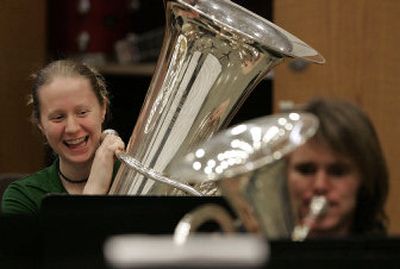New tuba player breaks orchestra gender barriers

ANN ARBOR, Mich. – It was 9:30 on a Saturday night and Carol Jantsch was at an ultimate Frisbee tournament when her cell phone rang with an audition invitation from the Philadelphia Orchestra, one of America’s finest symphonies.
Almost one year later, after beating out 195 other musicians during an arduous tryout process, the 21-year-old University of Michigan senior is the first woman – and perhaps the youngest person ever – to earn a tuba seat with a top-five U.S. symphony.
“This is no surprise for us,” said Michael Haithcock, Michigan’s director of bands. “Over four years, we’ve just been accustomed to Carol’s depth of talent.”
The soft-spoken Jantsch, daughter of an emergency-room physician and a vocal-music instructor, said her parents unwittingly started her tuba career when they forced her to take piano lessons at age 6.
It didn’t take long for her mother, Nancy, who teaches at Kenyon College in Gambier, Ohio, to hear her daughter’s talent: “She could make the simplest stuff sound very musical.”
Carol Jantsch became interested in low brass when she was 9 at an arts camp. She picked up a euphonium, the tuba’s smaller cousin, and could play it immediately.
“I always knew I was sort of ahead of the game,” Jantsch said.
Although she plays an instrument normally reserved for men due to their larger lung capacity, tuba professors say it doesn’t matter.
“You still have to be efficient,” said Don Harry, associate professor of tuba at the Eastman School of Music in Rochester, N.Y. “She’s the most efficient person, probably on the planet.”
She won a seat in Michigan’s top symphony band, one of only two or three freshmen to do so. Tuba instructor Fritz Kaenzig recalled that in Jantsch’s first studio class, she played a difficult sonata from memory.
“All the graduate students kind of looked at each other and rolled their eyes and said ‘Oh, no,’ ” he said.
As a sophomore at Michigan, Jantsch auditioned for the New York Philharmonic, finishing as a semifinalist. She kept looking for jobs, though major orchestra tuba posts open only once every two or three decades. When Philadelphia’s opened in 2005, Jantsch applied but was summarily rejected for lack of professional experience.
Her breakthrough came when she sent a CD to apply for Bar Harbor Brass Week, a summer program for college students in Maine.
Blair Bollinger, the Philadelphia Orchestra’s bass trombone player and chair of its tuba audition committee, is Bar Harbor’s music director. He listened to Jantsch’s CD, a performance of a difficult violin concerto she had transcribed for tuba.
“It really was expressive and technically brilliant,” Bollinger said. “I was just sort of flabbergasted.”
The Philadelphia Orchestra granted her an audition.
Jantsch advanced to the finals, and on Feb. 22 played against two men with far more orchestra experience.
At 11:30 p.m., the personnel director told all three that Jantsch had won the job, which pays about $102,000 per year.
She probably will start in Philadelphia in September.
“I feel like the Philadelphia Orchestra is getting somebody who is going to bring them great honor,” said Jantsch. “They’re taking a chance, but not really.”